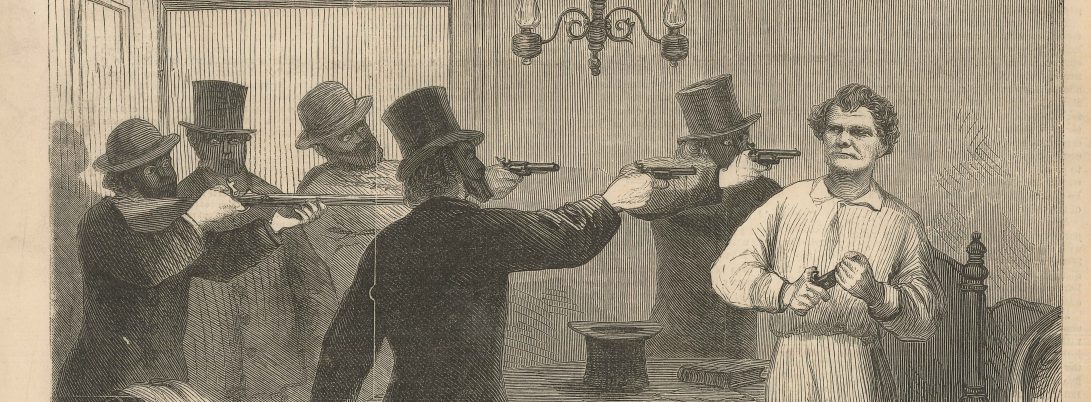Born in Georgia in 1814, George W. Ashburn was a White man cut from a similar cloth as American abolitionist John Brown. Although Ashburn was a southerner, born and raised, Ashburn believed in the immediate, complete, permanent eradication of slavery in the United States, without compromise.
During the contentious lead up to the American Civil War Ashburn was outspoken in his opposition to the South’s secession from the United States of America.
And when the South finally went ahead and broke away from the United States, Ashburn served as a Colonel in the United States Army and fought against the Confederacy during the American Civil War.
Ashburn knew all too well how obstinate his fellow southerners would be to any morsel of sharing equality with the enslaved African that they had mercilessly exploited for centuries.
During the 1860’s, Ashburn and his like minded ilk, were known as “Radical” Republicans.
Radical Republicans were the far-left faction of the leftist Republican Party which opposed the then conservative Democratic party. Radical Republicans believed in holding the South financially and morally responsible for the American Civil War.
In fact, a critical part of their agenda was protecting “freedpersons”, as they were called back then, from Black Codes which southern legislatures were putting in place at breakneck speed throughout the south in hopes of enslaving their black populations yet again.
These guys were too far left, even for Abraham Lincoln, who they often publicly criticized for being too lenient on the South, and in particular on former Confederates who they understood as having no intention whatsoever of coexisting peacefully side by side with their former chattel.
Nearing the end of the Civil war, some of Lincoln’s political opponents in the South, who had assumed before these Radical Republicans had come to power that Lincoln was the worst thing that could ever happen to them, now knew that things could be worse, much worse.
The Radicals passed their own Reconstruction plan through Congress in 1864, but predictably, Lincoln vetoed it.
In fact, things had gotten so contentious between Lincoln and this far left wing that Lincoln had come to realize that he couldn’t count on compromising with these Radical Republicans in Congress, and he began using his title as military commander-in-chief to push his own more lenient Reconstruction policies through without them. Then he was assassinated in April 1865, ironically by the very same Confederate sympathizers that the Radical Republicans were warning he wasn’t being tough enough on.
John Wilkes Booth later confessed that he’d decided to kill Lincoln after Lincoln suggested that Black soldiers who had risked their lives to fight the Confederacy as well as educated Black men should be permitted to vote. Booth spat, “That means nigger citizenship!” followed by, “That is the last speech he will ever make.”
And the rest is history.
Booth killed Lincoln three days later.
Days after Abraham Lincoln’s assassination, Ashburn wrote a personal letter to now President Andrew Johnson claiming that “the hand of God” had been in play with Lincoln’s murder because Lincoln wasn’t being hard enough on these ex-Confederates. But if these Radical Republicans thought Lincoln was too lenient with the South they would soon be wishing they had him back.
Now president Andrew Johnson, a former slave owner himself from Tennessee, was far more sympathetic towards fellow White supremacists in the South than he was freedpersons. When General William Tecumseh Sherman issued Special Field Orders No. 15, the military order to provide freedpersons 40 acres and a mule, it was Andrew Johnson who nixed it.
Andrew Johnson repeatedly vetoed congressional act after congressional act drafted by the Radical Republicans aimed at protecting freedpersons from Black Codes that were being passed throughout the South by southern legislatures.
Laws that Abraham Lincoln, had he not been assassinated, would’ve most certainly recognized for what they were, an attempt by the South to reestablish slavery under a different name.
For example South Carolina had passed a law that said if a Black person was found guilty of vagrancy (being homeless) the state could “hire them out” for no pay.
And there was a law in Georgia that said that orphaned Black children and/or children of destitute parents could be “given” to a White person under the guise of an apprenticeship, and forced to work until the age of 21 for men and 18 for women and if they ran away, they could be legally recaptured and put back to work.
In Mississippi their legislature passed a law that said that every January Blacks had to present paperwork that proved that they were under contract to work for the upcoming year and if they ever were to quit their job, they’d owe back all of the money that they had earned prior to quitting, and were subject to arrest and then made to work for free.
These laws and the hundreds of others like them were blatant, unadulterated White supremacy.
And Johnson was completely at peace with allowing the South, still governed by former wealthy slave owners, to solely decide the fate of former slaves as they saw fit.
Radical Republicans had seen enough.
In 1868 they attempted to remove Andrew Johnson from office through impeachment but failed to do so by a single vote.
A single vote.
While all of this was playing out in Washington, Ashburn had been appointed a Judge in Columbus, Georgia, by Georgia’s then military governor General George Meade who was most famous for decisively defeating Confederate General Robert E. Lee at the Battle of Gettysburg.
Ashburn, true to his commitment to abolish slavery without compromise was actively working to strike down laws the Georgia legislature was hoping to use to reinstitute slavery in the state.
Ashburn’s work had endeared him to the Black community in Columbus, Georgia and at the same time, understandably, made him a lot of bitter enemies across the South, many of whom were former Confederate officers, but particularly the ones who were in the newly founded Columbus chapter of the KKK.
On the night of March 30, 1868, Ashburn had participated at a huge gathering of Blacks and Republicans at Temperance Hall in Columbus, Georgia. Ashburn announced his intention of running for a seat in the U.S. Senate representing the state of Georgia. Unfortunately for him the KKK had other plans.
That night, after the gathering at Temperance Hall, twenty to thirty well-dressed men, five of whom were wearing masks, forced their way into his home and murdered him in cold blood.
When word of Ashburn’s murder reached General George Meade, he immediately implemented martial law in Columbus, removed the mayor from office and ordered any and all suspects to be arrested.
While George Meade was famous for decisively defeating Confederate General Robert E. Lee at the Battle of Gettysburg, he was also famous for something else, his short temper. Incensed at Ashburn’s murder he had all-in-all twenty possible suspects arrested and held for trial at Fort McPherson in Atlanta, Georgia.
Their penalty if convicted, was death by hanging.
Now here’s where it gets slimy.
The Federal government was pushing for Georgia to ratify the Fourteenth Amendment.
The Fourteenth Amendment, if passed, would grant citizenship to all persons born or naturalized in the United States—including former slaves—and guaranteed all citizens “equal protection of the laws”. Amendments to the constitution become valid only after they are ratified by the legislatures of three-fourths of the states, which would’ve been 28 of the 37 states at the time.
Well it was no surprise to anyone that the Georgia legislature was vehemently resisting ratifying the Fourteenth Amendment, and with General George Meade intent on getting justice for the murder of George Ashburn, the KKK and their friends in the Georgia State legislature offered General George Meade a “deal”.
The State of Georgia agreed to ratify the 14th Amendment in exchange for General Meade agreeing to cease prosecuting the 20 suspects he’d collected and planned to hang for Ashburn’s murder.
Reluctantly Meade accepted the deal.
All twenty suspects that were being held for Ashburn’s murder returned to Columbus to live out the remainder of their lives.
And no one was ever prosecuted for the first murder ever committed by the KKK in Georgia.
And that is the story of how the Fourteenth Amendment to the United States Constitution got ratified in the State of Georgia, by way of a compromise to spare the lives of White supremacist who had murdered a judge.
I think it is important to note here, if it isn’t already obvious, that the Republican Party of Lincoln was not the Republican Party that we are familiar with today. Men like George W. Ashburn couldn’t be further from the moral and political base or the political leadership of today’s Republican Party.
Don’t believe me?
In 2018, then President Trump, a Republican, said he was preparing an executive order that would nullify the 14th Amendment guaranteeing birthright citizenship in the United States.
Fortunately for America, U.S. Presidents can’t nullify constitutional amendments by executive order.
Even looking into the possibility of doing something like that, and of all the amendments, the 14th, the amendment that gave former slaves American citizenship would’ve had George W. Ashburn rolling over in his grave.

